As part of efforts to ensure proper health care among the Tema Metropolis, the Tema Metropolitan Health Directorate has formed a Risk Communication Committee to help with the dissemination of relevant health information to the population of the metropolis.
The committee, which was formed under the mandate of the Health Promotion Unit of the Directorate, has representation from all stakeholders to ensure all sectors of the metropolis are covered.
Some of the members are assembly members, media, veterinary services, social welfare department, traditional leaders, faith-based organisations, non-governmental organisations, environmental health, and School Health Education Programme (SHEP) coordinator, among others.
Dr. Sally Quartey, the Tema Metropolitan Director of Health Services, said it was very important for the directorate and its stakeholders to plan and be prepared to handle health issues that might arise in the metropolis.
Dr. Quartey said such a committee would enable the directorate to tackle both public and clinical care through discussions of health issues that would help the individual live a healthy life, which will have an impact on the public.
Ms. Nasiratu Imoro, a Health Promotion Officer at the Greater Accra Regional Health Directorate, taking members through their mandate, said COVID-19 had taught Ghana to be well prepared for any diseases that might come up.
Ms. Imoro said human interactions with the environment and animals expose them to numerous diseases, adding that, for instance, the onset of rain could lead to the outbreak of cholera and typhoid, among others.
She said epidemic diseases such as anthrax and cholera, diseases targeted for eradication such as Buruli ulcer and leprosy, as well as major diseases of public health importance, which include HIV/AIDS, and unusual events or conditions of public health and others, were all of importance to the committee.
She added that as part of the preparedness, there must be a Public Health Emergency Preparedness and Response Plan (EPR), a Public Health Emergency Management Committee (PHEMC), a Public Health Emergency Rapid Response Team (PHERRT), which is the technical team, as well as a Public Health Emergency Management Subcommittee, which serves as the operational team.
She further said simulation exercises, the compilation of a database of trained healthcare workers for surge capacity, and having disease-specific response plans must all be in place as part of preparedness.
The committee members gave the assurance that they would do their best to ensure a healthy metropolis.










Discussion about this post